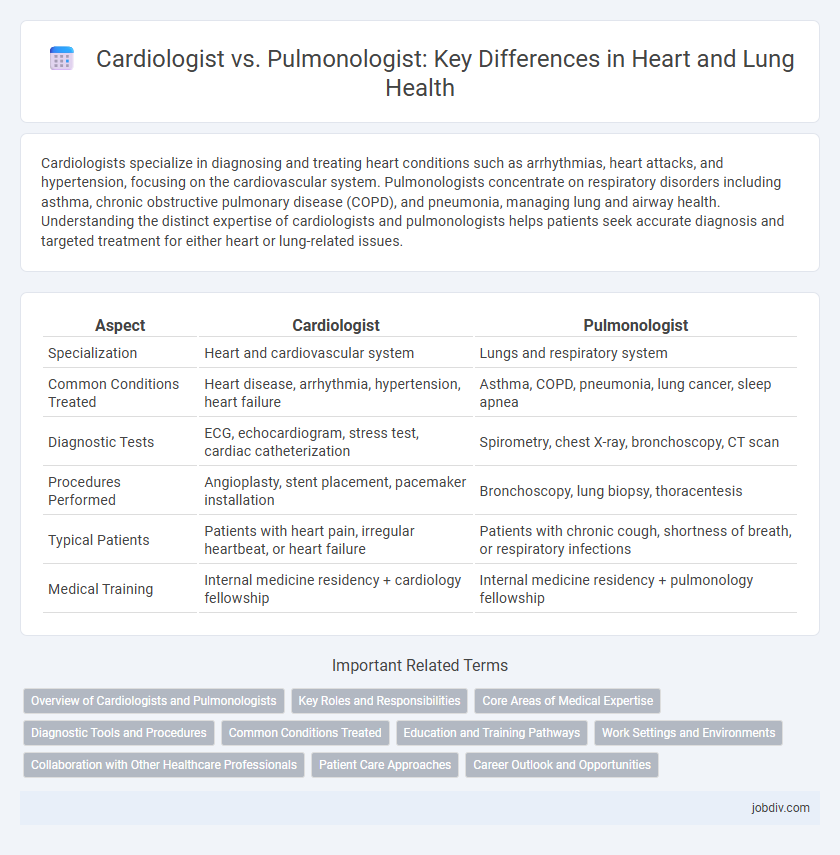Cardiologists specialize in diagnosing and treating heart conditions such as arrhythmias, heart attacks, and hypertension, focusing on the cardiovascular system. Pulmonologists concentrate on respiratory disorders including asthma, chronic obstructive pulmonary disease (COPD), and pneumonia, managing lung and airway health. Understanding the distinct expertise of cardiologists and pulmonologists helps patients seek accurate diagnosis and targeted treatment for either heart or lung-related issues.
Table of Comparison
| Aspect | Cardiologist | Pulmonologist |
|---|---|---|
| Specialization | Heart and cardiovascular system | Lungs and respiratory system |
| Common Conditions Treated | Heart disease, arrhythmia, hypertension, heart failure | Asthma, COPD, pneumonia, lung cancer, sleep apnea |
| Diagnostic Tests | ECG, echocardiogram, stress test, cardiac catheterization | Spirometry, chest X-ray, bronchoscopy, CT scan |
| Procedures Performed | Angioplasty, stent placement, pacemaker installation | Bronchoscopy, lung biopsy, thoracentesis |
| Typical Patients | Patients with heart pain, irregular heartbeat, or heart failure | Patients with chronic cough, shortness of breath, or respiratory infections |
| Medical Training | Internal medicine residency + cardiology fellowship | Internal medicine residency + pulmonology fellowship |
Overview of Cardiologists and Pulmonologists
Cardiologists specialize in diagnosing and treating heart and cardiovascular system disorders, including conditions such as coronary artery disease, arrhythmias, and heart failure. Pulmonologists focus on respiratory system diseases, managing issues like asthma, chronic obstructive pulmonary disease (COPD), and lung infections. Both specialists perform diagnostic tests, but cardiologists use tools like echocardiograms and stress tests, while pulmonologists utilize spirometry and bronchoscopy for patient assessment.
Key Roles and Responsibilities
Cardiologists specialize in diagnosing and treating heart-related conditions such as coronary artery disease, arrhythmias, and heart failure, focusing on cardiovascular health and performing procedures like echocardiograms and cardiac catheterizations. Pulmonologists concentrate on respiratory system disorders including asthma, chronic obstructive pulmonary disease (COPD), and pneumonia, utilizing tools like pulmonary function tests and bronchoscopy to assess lung function. Both specialists collaborate in managing patients with overlapping issues like pulmonary hypertension, ensuring comprehensive care through their distinct yet interconnected roles.
Core Areas of Medical Expertise
Cardiologists specialize in diagnosing and treating heart-related conditions such as coronary artery disease, arrhythmias, and heart failure, focusing on the cardiovascular system. Pulmonologists concentrate on respiratory system disorders including asthma, chronic obstructive pulmonary disease (COPD), and pulmonary fibrosis. Both specialists utilize advanced diagnostic tools like echocardiograms for cardiologists and pulmonary function tests for pulmonologists to guide treatment plans.
Diagnostic Tools and Procedures
Cardiologists utilize diagnostic tools such as electrocardiograms (EKG), echocardiograms, and stress tests to evaluate heart function and detect cardiovascular diseases. Pulmonologists rely on pulmonary function tests (PFTs), chest X-rays, and bronchoscopy to diagnose and monitor lung conditions like asthma, COPD, and pulmonary fibrosis. Both specialists employ advanced imaging technologies, including CT scans and MRI, tailored to their respective organ systems for precise disease assessment.
Common Conditions Treated
Cardiologists specialize in diagnosing and treating heart-related conditions such as coronary artery disease, arrhythmias, and heart failure, while pulmonologists focus on respiratory disorders including asthma, chronic obstructive pulmonary disease (COPD), and pulmonary fibrosis. Both specialists play a crucial role in managing conditions like pulmonary hypertension that overlap cardiovascular and respiratory systems. Accurate diagnosis and targeted treatment by cardiologists and pulmonologists improve patient outcomes in complex cases involving the heart and lungs.
Education and Training Pathways
Cardiologists complete medical school followed by a three-year internal medicine residency and a three-year cardiology fellowship focused on heart diseases and disorders. Pulmonologists also attend medical school, then complete an internal medicine residency before a specialized two to three-year fellowship in pulmonary and critical care medicine targeting lung conditions. Both specialties require board certification and continuing education to maintain expertise in their respective fields.
Work Settings and Environments
Cardiologists primarily work in hospitals, specialized cardiac care units, and outpatient clinics, focusing on diagnosing and treating heart-related conditions. Pulmonologists practice in similar settings, including intensive care units and pulmonary function labs, where they manage respiratory diseases and lung disorders. Both specialists often collaborate in multidisciplinary environments to provide comprehensive care for patients with overlapping cardiac and pulmonary issues.
Collaboration with Other Healthcare Professionals
Cardiologists and pulmonologists frequently collaborate with primary care physicians, radiologists, and respiratory therapists to provide comprehensive care for patients with complex cardiopulmonary conditions. Their teamwork ensures accurate diagnosis, integrated treatment plans, and optimized management of diseases such as heart failure and chronic obstructive pulmonary disease (COPD). Coordinated care among these specialists improves patient outcomes by addressing both cardiac and respiratory health in a holistic approach.
Patient Care Approaches
Cardiologists specialize in diagnosing and treating heart-related conditions using techniques like echocardiograms and cardiac catheterization to ensure precise cardiovascular care. Pulmonologists focus on respiratory system disorders, employing methods such as spirometry and bronchoscopy to manage diseases like asthma and chronic obstructive pulmonary disease. Both specialists prioritize patient-centered care by developing individualized treatment plans that address specific organ system health while coordinating with multidisciplinary teams for comprehensive management.
Career Outlook and Opportunities
Cardiologists and pulmonologists both have strong career outlooks due to growing incidences of heart and lung diseases, driven by aging populations and lifestyle factors. Cardiologists typically have higher demand in hospital settings and private practice, with opportunities expanding in interventional cardiology and electrophysiology. Pulmonologists face increasing opportunities in critical care units and sleep medicine, reflecting rising chronic respiratory conditions such as COPD and sleep apnea.
Cardiologist vs Pulmonologist Infographic

 jobdiv.com
jobdiv.com